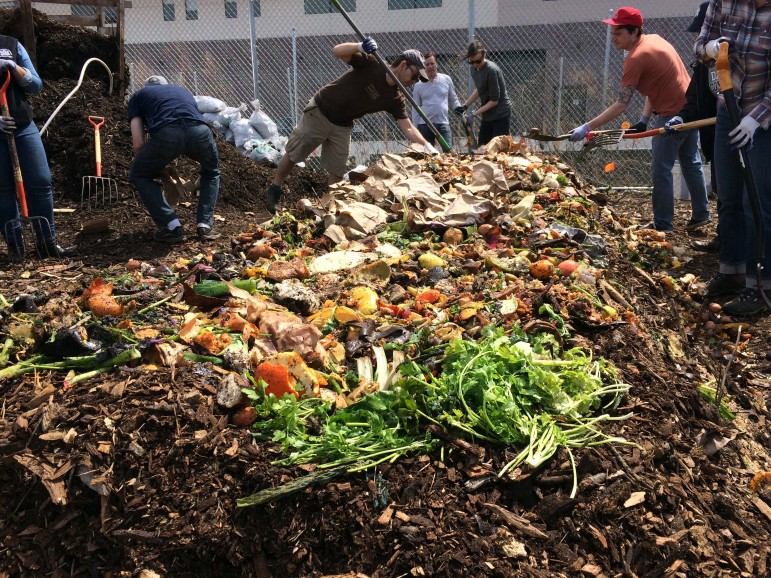‘We know how to reduce food waste, we just need to find the will to do it.’

Cole Rosengren
A compost build in Gowanus, Brooklyn.One-third of all food produced in the world is wasted prior to being consumed. This amounts to over $1 trillion worth of food, or more than the combined GDP of Singapore, New Zealand, and Denmark.
This massive amount of food waste is a solvable issue. Every individual must take action to reduce their waste. By reducing our food waste through consuming and purchasing less, we will save ourselves and the city money. If we do purchase too much food, we can help feed our communities by donating this food rather than throwing it in the trash. While we strive to meet those two goals, we will generate food waste. Instead of contributing to climate change by sending our food to landfills, we should take advantage of composting opportunities to reduce our emissions.
 CityViews are readers’ opinions, not those of City Limits. Add your voice today!
CityViews are readers’ opinions, not those of City Limits. Add your voice today!
Reducing food waste saves money. NYC annually spends $1 billion managing solid waste; 18 percent of residential waste and 10 percent of commercial waste is food waste which can be dramatically reduced through smarter consumption, increased composting opportunities, and diverting edible food to those in need. Reducing food waste can save restaurants, on average, $7 for every $1 invested by eliminating disposal costs and excess purchasing costs. In an industry already operating on the slimmest of profit margins, restaurants cannot afford to continue wasting food. The average household wastes $1,800 each year through overbuying and food spoilage. This $1,800, I’m sure, each family would rather have in their pockets than the trash can.
Food waste is a major contributor to climate change due to its emission of methane, which has 26 times the warming power of CO2. Nearly 37 percent of food waste occurs in the home, and in NYC, the average household wasted 8.4 pounds of food each week. This is mostly due to buying more than we need during our trips to the grocer and then throwing out that food when we don’t eat it. Being smarter consumers will drive down household food waste but, inevitably, there will still be some organic material to dispose of. Instead of tossing this waste in the trash, we can limit its environmental impact by composting. Large scale composting by NYC residents will greatly reduce the release of methane from food waste.
Feeding America, a national nonprofit, works by partnering grocers and restaurants with food banks that use the excess to feed their communities. The Food Bank for New York City, a member of Feeding America, has distributed 10 million meals over the last 18 months. These meals are only able to be given to those in need by donations. By incentivizing donations with tax reductions, NYC can both reduce food waste and food insecurity in the five boroughs. When we reduce waste and consumption, we can donate more.
READ MORE: Curbside Composting Program Restarts with Low Participation and High Cost
While every individual can take steps to decrease waste by purchasing less, the city government needs to expand composting opportunities citywide. After pausing during the pandemic, curbside composting has resumed so far in just one Brooklyn community district. The government has designated drop off sites for food scraps in every borough but some have many fewer sites, with Staten Island, the Bronx, and South Brooklyn being some of the most barren. These “gaps” are normally filled by partnering with community organizations, but the city should unilaterally extend the service to these underserved areas. The city must also look at frameworks to incentivize grocers and restaurants to donate excess food to food banks and pantries. City tax breaks that mimic existing federal deductions, which saw an increase of 136 percent in food donations, would be a good place to start.
If the point doesn’t seem obvious by now, it is this: we waste too much food. This food costs us a tremendous amount of money. If we send this food to landfills it will contribute mightily to climate change. Wasting less food can help ensure our neighbors don’t go hungry. Wasting less food can divert money to more important things like education, healthcare, or infrastructure. We know how to reduce food waste, we just need to find the will to do it.
Kevin Irving is a lieutenant in the Navy, and a MPA-PNP candidate at NYU Wagner School of Public Service.









One thought on “Opinion: New York City’s Food Waste is a Solvable Issue”
Such a great read and excellent analysis of the food crisis we face in NYC–well done Kevin!